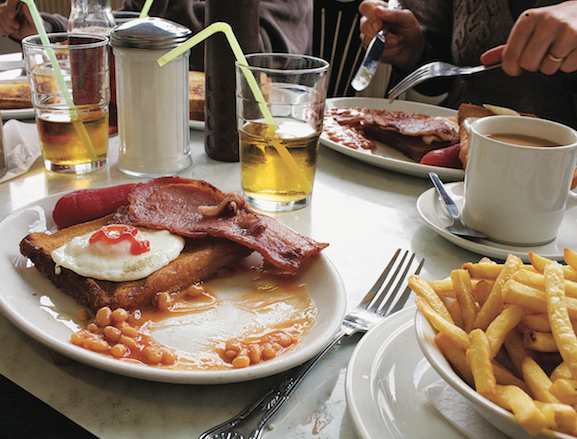The Great British Bacon Scare of 2013
Please don’t bring home the bacon: Leah McLaren explains
Share

As one of the most rational, secular nations on Earth, Britain still has a few things it approaches with a collective passion verging on religiosity. These include football fanship (the European kind), alcohol (any old kind), dry wit as a proxy for emotion and cured, fried pig fat squished between white bread.
While the first three have a host of well-documented attendant dangers, it appears the bacon sandwich, that class-vaulting culinary staple for the ages, may prove the most dangerous by far. A new study released in the U.K. this month has found that British consumption of processed meat (meaning bacon, sausage, ham, mince or any meat that’s been salted, cured or chemically treated) can be blamed for an increased risk of early death, heart disease and cancer.
The findings were published in the journal BMC Medicine and are based on a study tracking the diet and lifestyle of almost 450,000 people in 10 European countries for an average of nearly 13 years. Admittedly, people who ate large quantities of processed meat were also more likely to smoke, drink heavily and have an unhealthy lifestyle. But even controlling for these factors, scientists still found that regular consumption of processed meat raised a person’s risk of heart disease by 72 per cent and cancer by 11 per cent, as well as accounting for a whopping 3,000 early deaths per year in the U.K. That’s one in 30 untimely bucket-kicks per annum down to regular servings of the hard-working bacon butty.
Naturally, in my home, we are ignoring this study. As the old wartime poster says, we have resolved to “keep calm and carry on”—eating bacon, that is. As the columnist Suzanne Moore tweeted last week, most Britons would “rather die” than not have a bacon sandwich. The study might be grim, but the broader cultural backlash has provided both comfort and amusement. In her blog for the Daily Telegraph, the writer Christine Odone declared she is also mentally blocking the so-called bacon scare because her carnivorous family’s “relish is so palpable” and she cannot possibly afford to do otherwise with basic cuts of meat generally being more pricey and tricky to prepare than bacon and sausages.
The bad news comes hot on the heels of the U.K.’s horse-meat scandal, and the media have dubbed it “the bacon scare,” but I’d be surprised if it makes any difference to Britain’s deeply engrained love of processed pork. As a nation, the U.K. slaughters 165,000 pigs a week, but that doesn’t even begin to account for the amount of pork product consumed, since the vast majority is cheaper stuff imported from overseas.
Jay Rayner, the restaurant critic, TV personality and author of the forthcoming book A Greedy Man in a Hungry Planet, told me in an interview that the British love of bacon is not just a preference but a food passion bred in the bone. “It came out of a pre-agricultural system in which the keeping of pigs in a small holding manner was extremely common. They were efficient because you could fatten them up on your waste product, but a pig is a whole lot of animal and, once slaughtered, the only thing you could do was preserve it. Curing meat is a very straightforward way of doing that, and a whole culture of recipes grew up around it.” In other words, the British have adored bacon, ham and its many salty, fatty offshoots for hundreds of years, and for essentially the same reason: it is cheap, simple to prepare and undeniably tasty.
Even the Guardian, that bastion of vegetarian liberal values, ran its own analysis in the wake of Bacongate, essentially telling readers to calm down; they probably weren’t going to drop dead from scarfing the occasional packet of pork rinds. And no less than the head of the nutritional sciences research division at King’s College London raised doubts about the study. “Tobacco use is such an enormously potent factor that it contaminates the findings,” professor Tom Sanders pronounced. His point is that while the researchers may have thought they were controlling for tobacco, the fact that most of the baconaholics were also regular smokers is just too persuasive a factor to be adjusted for.
It’s just not cool to hate on bacon these days. Frankly, it’s off-trend. There’s been a cheap-meat renaissance here in recent years, spurred by the British-originated trend of “tip-to-tail” eating, which made it socially acceptable, even cool, to consume vast amounts of pork belly, blood pudding and pig face—so long as it’s prepared by a famous chef at a very expensive east London restaurant.
Rayner, an avowed fan of the cured pig himself, says he won’t be changing his eating habits, though he will continue hitting the gym and supplementing with vegetables. While he knows there are certain risks associated with processed pork, we can’t abandon the notion that everything is best in moderation—including moderation itself.
“In the midst of all this, it’s important to remember human life expectancy is rising all the time,” he pointed out. Besides, he added, “If you’re the sort who bothers to read the news of these reports, you’ve probably got a balanced diet anyway. And if you’re the sort who eats processed meat on pizza five times a week, then the bacon is likely the least of your problems.”